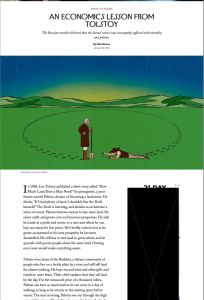Join getAbstract to access the summary!

Join getAbstract to access the summary!
Nick Romeo
An Economics Lesson from Tolstoy
The Russian novelist believed that the dismal science was inescapably suffused with morality and politics.
The New Yorker, 2024
What's inside?
Leo Tolstoy saw economics not as a cold realm of immutable dictates but as a study of human behavior.
Recommendation
Leo Tolstoy’s stories show that economics can be a force for social change rather than simply a science of fixed laws and outcomes. Journalist Nick Romeo engagingly assesses Tolstoy’s work in highlighting human behavior in business, and he notes lessons that are as resonant today as they were more than a century ago. Romeo also reports on the shift now occurring within the dismal science, one that augurs a better understanding of commercial activity through the combined study of economics, politics and philosophy.
Summary
About the Author
Nick Romeo is a journalist at the New Yorker, a teacher at UC Berkeley’s Graduate School of Journalism and the author of The Alternative: How to Build a Just Economy.

















Comment on this summary